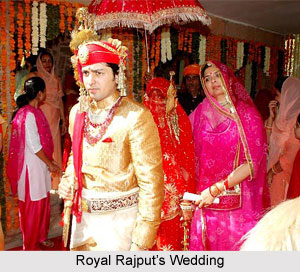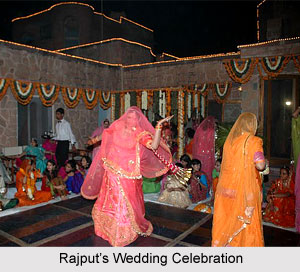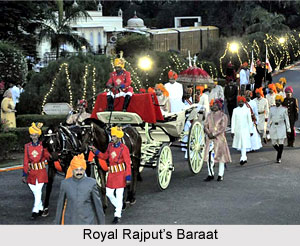 The royal wedding of the Rajputs has created a unique enigma over the years. Rajputs have still carried forward the custom of the royal family weddings. The ceremonies are always moderate and the proceedings are marked with apparent firmness. The royal Rajput wedding takes place amidst of medieval grandeur and majestic brilliance with all the splendid equipments of royal weddings since ages. Preparations for a conventional Rajput wedding begin much before than the actual ceremony.
The royal wedding of the Rajputs has created a unique enigma over the years. Rajputs have still carried forward the custom of the royal family weddings. The ceremonies are always moderate and the proceedings are marked with apparent firmness. The royal Rajput wedding takes place amidst of medieval grandeur and majestic brilliance with all the splendid equipments of royal weddings since ages. Preparations for a conventional Rajput wedding begin much before than the actual ceremony.
Match-Making in Rajput Wedding
The matchmaking process comprises of a vital role in the Rajput wedding which considers various facts that match between the couple. The family and their background, is given the most importance and much care is taken to ensure that the alliance is perfect. The status of both families has to be at par. It is also very essential that the bride and the groom come from separate clans. The horoscopes have to be accepted and coordinated by the family astrologer. Rajputs prefer to marry within the community only. However, there are exceptions if either the bride or the groom comes from a royal family.
Costumes in Rajput Wedding
Both the bridal costume and groom`s attire are eye catching and attractive ones. The bride wears a traditional Rajasthani dress. The bridal dress comprises a Ghagra or a long pleated skirt, a gorgeous blouse and a dupatta. The clothing is always colourful as to put up a distinction to the dull bleached hue of the sands across the Thar Desert.
Majority of the traditional bridal wear is in red but other bold colours like orange, bright yellow and various shades of pink. A lot much jewellery adorns the bride as well. There would be the Rakhri or a circular piece of jewellery for the forehead, hanging earrings, the Timaniyaan or a choker studded with uncut diamonds, the Chooda or a set of ivory and gold bangles, the Bajuband or gold and stone-studded armlets, gold anklets and the Bichhiya or gold toe-rings for the feet and finally, there is the geometric shaped Nath or the stone-studded nose-ring.
The groom`s attire is the conventional attire for the Rajasthani males. The costume includes a long coat in golden colour known as the Achkan. Majestic saffron turbans are worn along with a churidar or tight salwars and royal shoes. Surprisingly, the groom also wears some eye-catching jewellery. The jewellery includes the Serpech, which is worn on the turban. Sometimes necklace is also worn around the neck and along with a cummerbund at the waist.
 Rajasthani Wedding Rituals
Rajasthani Wedding Rituals
Some of the rituals that deserve a special mention are the Haldi ceremony, Mehendi ceremony and the ladies Sangeet that form an inseparable part of all Rajput weddings in Jaipur. Various fascinating traditional rituals are performed on the Rajput weddings. Dressed in heavy brocade Lehengas, ethnic jewellery and Henna adorned palms and feet, the glowing bride awaits the onset of the groom under a brightly decorated veil. The groom, along with his relatives and friends, known as the Baraati, arrives at the venue with a lot of fanfare and is received with the tune of Shehnai, sprinkled with rose petals and rose water.
Rajput grooms put on exquisite Sherwanis and colourful turbans. Almost all Rajput grooms carry the traditional sword, which is a sign of the typical Rajasthani pride and valour. The main royal wedding ceremony is fixed in a regally decorated Mandap ornamented with hand decorated earthen pots, marigolds and other exotic flowers. The Rajput marriages are elaborate and traditional affairs that last for a couple of days. Various types of rituals and events are conducted through out this period of the marriage ceremony.
Pre-Wedding Rituals
Numerous rituals and events are conducted by the family members prior to the weeding. The pre wedding rituals announces the magic of the auspicious day.
Tilak Ceremony
Tilak Ceremony is the official engagement ceremony among the Rajputs. Mainly the male members of the bride`s family go to the groom`s house. Only the bride`s father, brother and other male relatives actively participate in this ceremony. The ceremony, as its name goes, describes the bride`s brother applying the tilak to the groom`s forehead. The men from the girl`s family usually present the groom with plentiful gifts such as sword, expensive clothes and accessories, sweets, fruits etc. This ceremony makes the engagement official.
Ganapati Sthapana and Griha Shanti Ceremony
Few days before the actual marriage, the Ganapati Sthapana and Griha Shanti ceremony takes place. These are conducted as very important as it takes place in the place of the ring ceremony. The groom or bride`s parents to propitiate the gods perform a Havan and an idol of Lord Ganesh is placed. All ceremonies start only after the sthapana or installation of the god.
Pithi Dastoor Ceremony
This is a lovely ceremony, which takes place at both the bride and the groom`s residences. The rituals include the application of turmeric and sandal wood paste to the one going to get married. The bride and the groom would not leave their respective houses after the Pithi starts. The Pithi Dastoor takes place on a grand scale at the bride`s house.

For the occasion, the bride has to wear a traditional orange dress. She is made to come under a silken, decorated canopy that is held with the help of swords at the four corners by four ladies. These ladies should belong to the same clan. Then she is brought to the ladies gathering and these ladies then apply the Haldi paste on her skin. The Pithi at the groom`s place is held on a minor scale. Dholans or the women singers with dholak, sing auspicious pre-wedding songs while the ceremony is in progress. Throughout the wedding celebrations, the dholans are present, along with the Shehnai and the nagara players.
Mahira Dastoor
It is again a custom exclusive to the Rajputs only. It takes place at both the bride and groom`s houses. This particular ceremony involves the maternal uncle of either side. The maternal uncle along with his family arrives with much fun and frolic. The respective families receive him with greetings. The uncle then gives clothes, jewellery and sweets to the entire family. It is a ceremony that symbolises the fact that the maternal uncle has to lend a hand of help at the expenditure that his sister undergoes during her child`s marriage.
Janev Ceremony
Janev ceremony is an essential ritual of the Hindu marriages. It depicts the rite of making the groom wear the sacred thread. Men wear the Janev only. The groom is made to wear the Janev on the eve of his becoming the householder. He is made to wear a saffron robe and perform a Yagya, a Hindu ritual, with the priest. The Rajputs wear the saffron robe with the thought that the groom has two particular choices before him. One that of renouncing the world by becoming an austere; and the other is of getting married and accepting the responsibilities of married life. At the end of the Yagya, the groom has to act as if he wants to become an ascetic by running away. And the maternal uncle tries to stop him and persuade him to get married.
Palla Dastoor
Palla Dastoor is one of the customs typical to the Rajputs. The ritual involves the people from the groom`s family coming with the trousseau called the Palla Dastoor. A day or two before marriage some relatives from the groom`s family come along with a set of things like the clothes and the jewellery, which the bride has to wear during the wedding time and also some gifts.
Rajput Baraat
Rajput Baraat is divergent from all other Indian Baraat styles. It is elegant, balanced and individualistic. The Baraat group consists of only the male members of the groom`s family. Ladies do not take part in the procession. As much as that there is no dancing as the Baraat progresses across the street. The groom usually rides an elephant or a horse and also carries a sword. Also, each of the other male members of the family carries a sword as a convention.
Wedding
The bride`s mother takes the groom to the ladies section after performing the customary Aarti. He is then preceded towards the wedding Mandap. In all this only a married male relative, a brother, or a male cousin goes along with him. The wedding takes place as usual with the Yagya fire and the Vedic mantras. The only exceptional thing about the whole matter is that the bride has to keep her face hidden behind a long veil throughout the marriage. The women of the family mostly attend this ritual, as the men of the house remain busy attending the guests.
Bidai
Bidai or farewell to the bride takes place a little strangely in the Rajput clan. The norm is that during the Bidai, a coconut has is placed under the wheel of the car. The moving car has to break the coconut before going on further. The bride would pull up her veil before she rides the car. The husband normally gives his wife a piece of jewellery as a Mooh Dikhai or a token gift as a sign of appreciation for showing her face.
Post Wedding Rituals
in the Rajput weddings, the post wedding rituals also comprise an important part in the rituals of Rajput weddings. After the wedding is over, starts the post wedding rituals which are equally colourful.
Grihapravesh
Grihapravesh is actually the entry of the bride into her husband`s house for the first time. Some important Pujas and other rituals take place as the bride arrives at the Sasural or the father-in-law`s house. Certain traditional games are played between the bride and the groom in order to make the new bride feel welcomed.
Pagelagni
The day after the Grihapravesh, the ritual of Pagelagni takes place. This is a ceremony where the bride, still in veil, is formally introduced to all the members of the family of the groom who bless her and give her gifts of different kinds. The veil is then finally removed.
Celebrations in Rajput Wedding
The Mehfils are the prime attractions of the Rajasthani wedding. A Mehfil is a stage to rejoice, where the ladies of the house gather for music and dance evening. There is of course a Mehfil for the men as well. At the ladies Mehfil, the women gather together at a surrounded courtyard or hall. They are usually decked up in sparkling dresses of all colours. Then, they perform Ghoomar, a famous Rajasthani dance. The bride at the Mehfil is given the position of the guest of honour.
The ladies Mehfil at the groom`s place is the same except for the groom being allowed to be present at only ladies programme. The men`s Mehfil at both the bride and the groom`s residences have a different taste altogether. In these Mehfils, professional singers are invited to perform and these are exclusive for male parties.
Cuisine of Rajput Weddings
Rajput cuisine comprises vegetarian as well as non-vegetarian delicacies. The Rajputs who are Vaishnavas and those who worship Lord Krishna are strictly vegetarian and the cuisine has the dishes, which are traditional and purely Rajasthani like the Daal-Bati. Daal-Bati is a dish of cooked lentils and roasted balls of dough, served along with a number of dried or pickled berries cooked in different ways. The warrior classes among the Rajputs take non-vegetarian dishes. The food is again miscellaneous, inclusive of the seafood and vegetarian dishes. Then, there are the tandoori mixed grill delicacies with chicken, lamb, fish, and shrimp, and a dash of curry offerings.

















